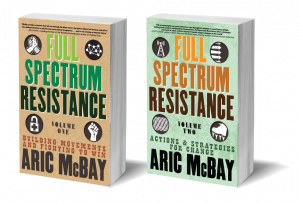There’s a difference between dissidence and resistance. A dissident believes that those in power are acting badly, that society is unjust, but a dissident doesn’t materially try to stop those things. Their primary activity is believing and sharing their beliefs with others. Resisters put their beliefs into action. They work to disrupt or dismantle the social, economic, and political systems that cause injustice and exploitation.
If we want to have a livable future, we need to move beyond dissidence to real resistance. And we must understand the kinds of tactics that resistance movements use to win.
The mainstream left in Canada, the United States, and much of the industrialized world has allowed itself to be whittled down to two main tactics: electoral politics and “ethical” consumerism.8 If someone hands me a leaflet or emails me a call to action, I can be almost certain that it will tell me either to write to my “elected representative,” or to “vote with my dollar” by purchasing some supposedly moral product, or both. You could add a third main tactic—awareness raising—but the intention is usually to drive people to either change their vote or their buying habits.9
It is no surprise that these are the tactics that remain. Government and capitalism are the two most powerful systems in society, and these tactics are intended to appeal to them. But these tactics also offer very little leverage and—for reasons I will discuss—have rarely achieved any gains alone.
By limiting ourselves to these tactics, we ignore the vast repertoire of tactics available to us. We also doom ourselves to ineffectiveness, and being ineffective further undermines our ability to mobilize action and recruit new activists.
The truth—so difficult to accept for those of us raised in the tradition of the liberal left—is that good examples and cogent arguments alone have never stopped exploitation or upset entrenched systems of injustice. They have not done that in the past, and they will not do it now. What we need is to mobilize political force and to confront injustice directly. In other words, to fight.
The idea of fighting back makes the liberal left deeply uncomfortable. This is because the liberal left identifies so closely with those in power—and sees itself as part of those power structures, the “loyal opposition.”10 Those who break that loyalty lose the privileges that come with the position.
The liberal left is also uncomfortable with fighting back because it has developed a mythology of social change that bears little resemblance to reality, but I’ll come back to that.
Like many grassroots activists, I have grown extremely frustrated with the timidity of liberals when it comes to confronting systems of oppression. Not only because they should be fighting back, but because in fearfulness they hold others back.


